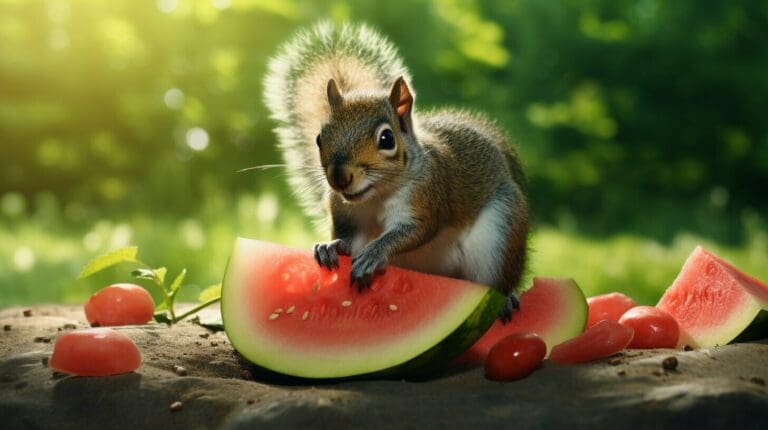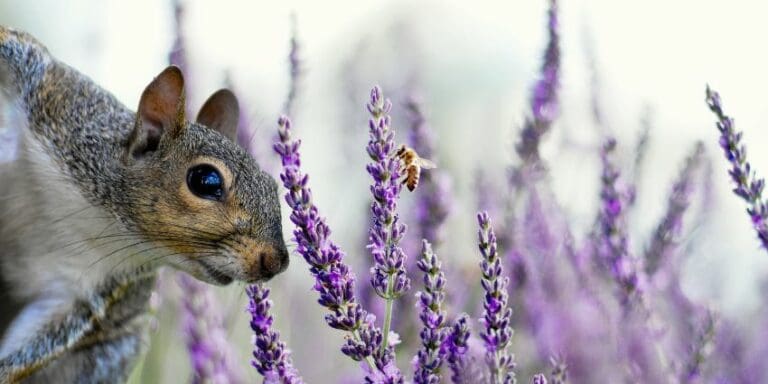Do Squirrels Eat Tulip Bulbs? Discover a True Gardener’s Insight
Have you ever marvelled at the sight of your garden only to find your prized tulips under siege by local wildlife? From my experience, understanding squirrel behavior and diet is crucial when asking, ‘Do squirrels eat tulip bulbs?’ Though it might look like these agile creatures are feasting on your bulbs, their interaction with your garden’s blooms is more about curiosity than appetite. The actual reason behind their interest in your tulips is more intricate than a simple craving for the bulbs.
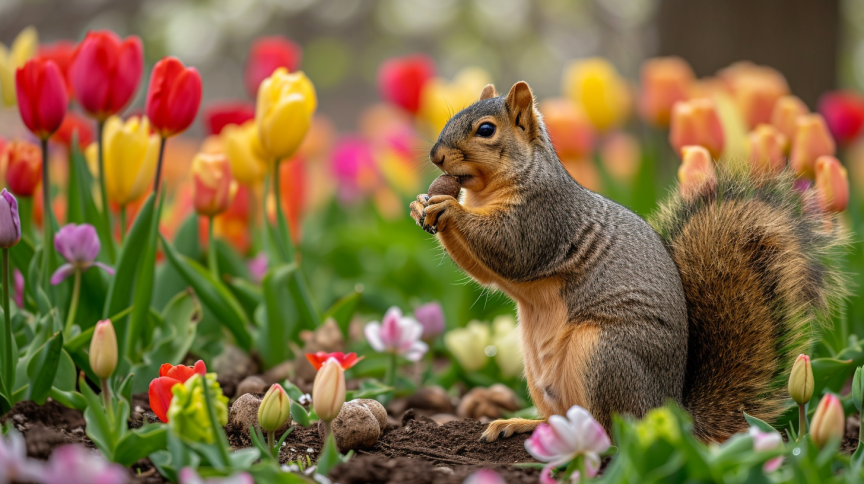
Do Squirrels Eat Tulip Bulbs?
Yes, squirrels do eat tulip bulbs. These bulbs are a source of food for them, especially in the fall and winter. Gardeners often find squirrels digging up tulip bulbs, which can be frustrating. It’s advisable to use protective measures like netting or planting deterrent plants to safeguard tulip bulbs from squirrels.
As you prepare your garden for the blooming season, delve into the unexpected habits of these furry foragers. With a better comprehension of why squirrels dig up bulbs and a few strategic tips, you can transform your garden into a place where tulips thrive despite the wildlife. Get ready to outsmart those adorable yet mischievous squirrels with proven gardening insights!
The Puzzling Behavior of Squirrels with Tulip Bulbs
As you explore the myriad of challenges in gardening, you may find yourself pondering the question: do squirrels eat tulip bulbs? This conundrum brings many avid gardeners to their knees, seeking to protect their beloved flowers without causing harm to the very creatures that enchant our backyards. It’s not simply a matter of a squirrel’s diet; it’s a quest to understand their cryptic habits to ensure the prosperity of your tulips.
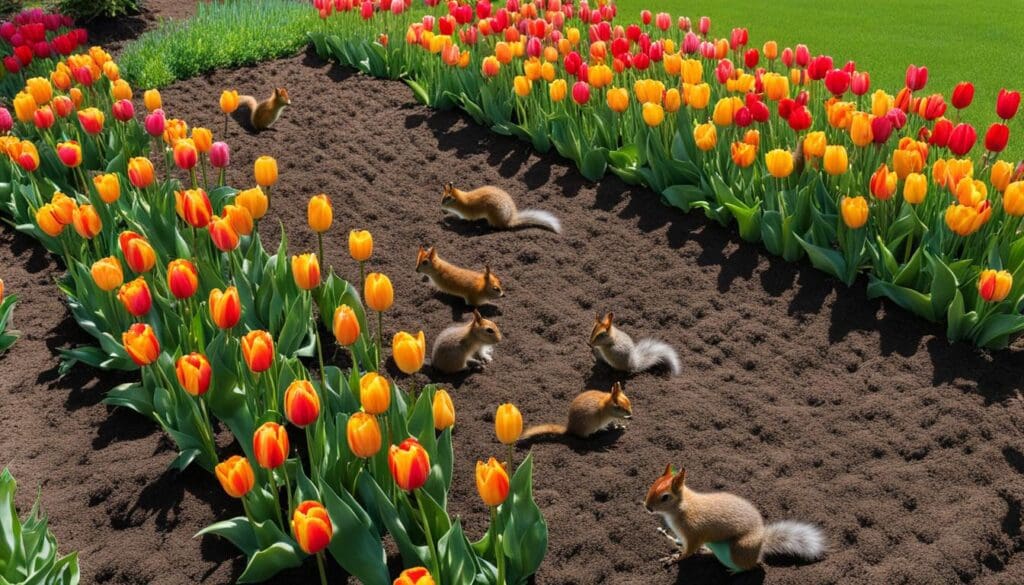
Let’s embark on this journey to unravel why squirrels may appear to sabotage your tulip bulbs, employing wisdom and wit to safeguard them. It’s about fostering a coexistence with nature while nurturing the garden you take pride in.
Why Squirrels Are Attracted to Bulb Gardens
It may seem counterintuitive, but squirrels do not inherently have a palate for tulip bulbs. Their interest in freshly turned earth is often a mistaken quest for hidden caches of nuts. Your gardening activities mimic the signals squirrels use to identify where other animals might have stored food, triggering their natural digging behavior.
Do Squirrels Eat Tulip Bulbs: Understanding Squirrel Foraging Habits
The habits of squirrels are both fascinating and frustrating for gardeners. While visually stunning, your tulip bed serves as an accidental signal to squirrels. The soft, disturbed soil is nearly irresistible to them, as it suggests the potential reward of food placed there by another.
The Bite-and-Toss Phenomenon
Imagine the dismay you discover them discarded and nibbled after meticulous bulb planting. This odd ‘bite-and-toss’ action leaves many gardeners bewildered. Tulip bulbs, unearthed and sampled only to be left behind, tell a tale of a squirrel’s exploratory but non-predatory interaction. This interaction calls for tulip bulb protection strategies that involve understanding and outsmarting these creatures. So, as you consider how to deter squirrels from eating tulip bulbs, remember it’s a game of wit, not warfare.
- Squirrels are attracted to soil disturbance, mistaking it for a food source.
- Protective measures that do not involve harming the local wildlife should be taken.
- Understanding the behavior of squirrels can lead to innovative and humane solutions for your garden.
Understanding Squirrel Behavior to Protect Tulip Bulbs
As a gardener, your tulip bulbs are precious, and watching them fall prey to squirrels can be disheartening. But before declaring war on these furry critters, let’s understand their curious behaviors. While squirrels may be the culprits behind the disappearance of tulip bulbs, they do it not out of malice but by instinct. Their foraging habits lead them to investigate freshly disturbed soil, often mistaking your newly planted tulip bulbs for a stash of food. Your gardening challenge, therefore, is not about preventing squirrels from eating tulip bulbs out of hunger but about outsmarting their natural tendencies.
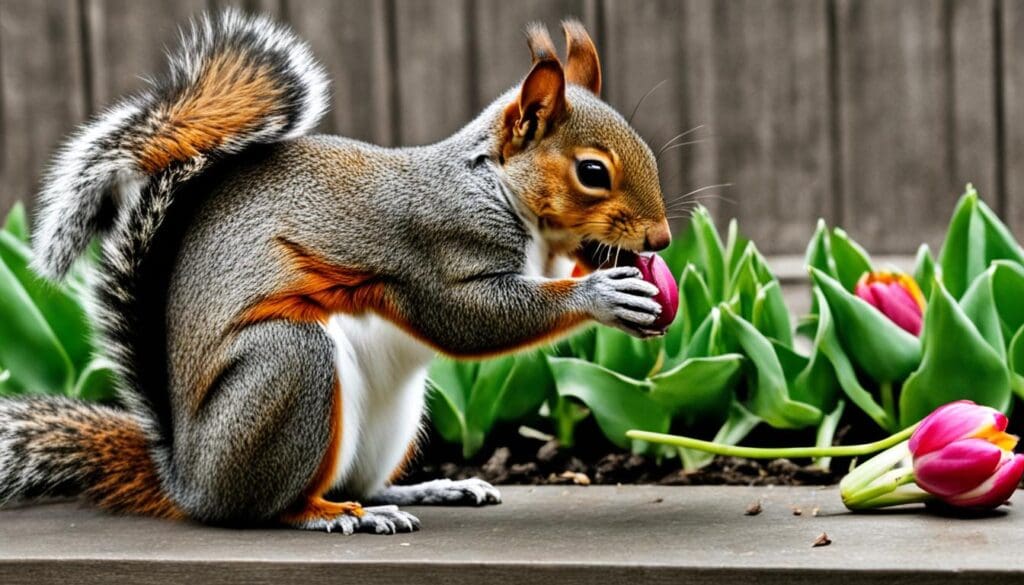
Thankfully, we can use this knowledge to our advantage. Employing methods of tulip bulb protection that align with the quirks of squirrel behavior can save your garden from becoming a squirrel’s playground. It doesn’t have to be a battle but a strategic game of safeguarding your garden’s allure.
Here are some effective strategies for squirrel-proofing tulip bulbs that can help keep your tulips safe:
- Plant unattractive species: Select tulip varieties less appealing to squirrels or pair them with repellent plants like alliums or daffodils.
- Deeper is better: Plant your bulbs deeper to make it harder for squirrels to detect and reach them.
- Disguise your work: Cover the area with materials like shredded leaves to camouflage the disturbed soil once planting is done.
- Employ chicken wire: Secure the planting area with chicken wire, which can be a physical barrier for squirrel digging.
- Repellents as a last resort: Consider using a squirrel repellent for tulip bulbs, but ensure it’s environmentally friendly and safe for other wildlife.
Let’s take a closer look at these methods:
| Method | Description | Pros | Cons |
|---|---|---|---|
| Barriers | Using materials like chicken wire to create a physical defense above or below the soil. | Effective; provides strong physical protection. | Installation effort; may need to be removed before blooming. |
| Deeper Planting | Planting bulbs at least 8 inches deep. | Utilizes squirrels’ natural digging depth limit. | Requires precise planting. |
| Repellents | Applying substances like Critter Ridder to deter squirrels. | Can be quick and easy to apply. | Potential harm to environment and non-target species. |
| Camouflage | Covering the soil with materials that hide the signs of disturbed soil. | Simple and natural method. | May need replenishing over time or after rain. |
| Repellent Plants | Incorporating less appealing plants to squirrels around tulip bulbs. | Enhances biodiversity; double as ornamental plants. | May not be foolproof depending on the squirrel’s determination. |
By preventing squirrels from eating tulip bulbs, you create a harmonious space that’s flourishing with tulips and respectful of wildlife. Remember, the aim is not to harm, but to coexist peacefully with the creatures around us. With the right measures in place, your tulips can bloom undisturbed, adding that splash of color to your garden that every gardener dreams of.
Evaluating the Extent of Tulip Bulb Damage by Squirrels
As you assess the state of your garden, understanding the signs of tulip bulb damage by squirrels can lead you to effective prevention methods. By identifying key indicators of squirrel activity, you’ll gain insights into their behavior patterns, which can, in turn, guide you on how to protect your tulip bulbs effectively. It’s important to recognize the unique traces left behind by these critters to differentiate their handiwork from other potential garden pests.
Do Squirrels Eat Tulip Bulbs: Telltale Signs of Squirrel Activity
When examining your garden for possible tulip bulb damage by squirrels, look for common evidence such as disturbed soil, often near planting sites. You might also find tulip bulbs that have been dislodged from the earth and exhibit singular bite marks, as well as random caches of nuts that have replaced your carefully planted bulbs. These clues point to squirrels exploring and foraging within your garden.
Differentiating Squirrel Damage from Other Pests
While squirrels are known for their particular way of interacting with tulip bulbs, it’s crucial to differentiate their damage from that caused by other garden pests. Damages by voles, for instance, usually don’t leave the same signs as squirrel interference. Understanding what distinguishes squirrel behavior will help you target the right adversary and choose the most effective countermeasures to keep squirrels away from tulip bulbs.
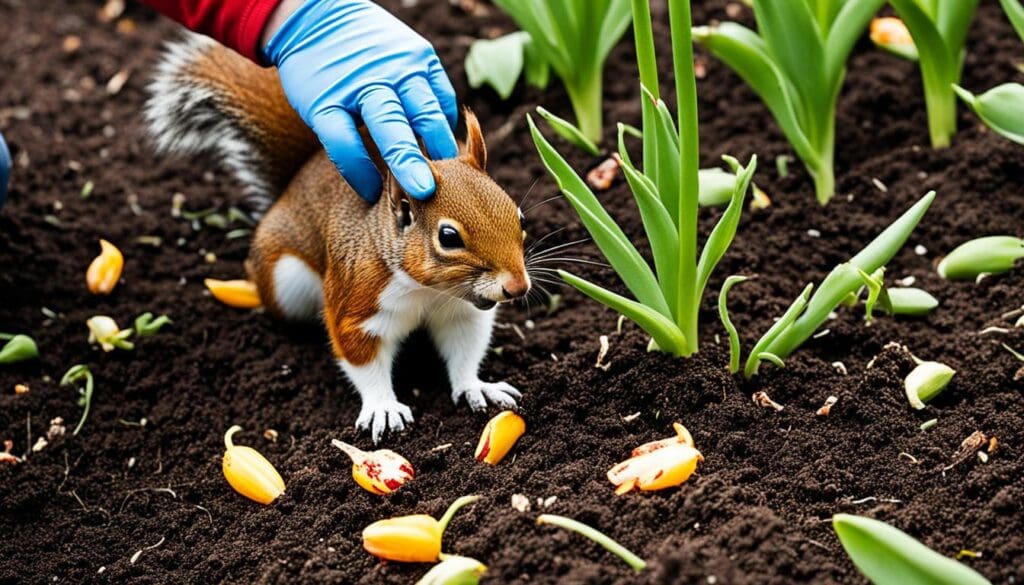
- Disturbed soil, especially where bulbs are planted, can indicate recent squirrel activity.
- Tulip bulbs found on the surface with bite marks often indicate squirrels investigating the area.
- The finding of nuts and acorns where tulip bulbs were previously indicates squirrels may be using the space for storage.
Recognizing these signs helps craft a plan to safeguard your garden against these bushy-tailed visitors while maintaining an animal-friendly environment. Taking time for this evaluation leads to informed decisions when implementing strategies to protect your vibrant tulips from unwanted disturbances.
Do Squirrels Eat Tulip Bulbs: Proactive Tulip Bulb Protection Strategies
As you gear up for the planting season, safeguarding your tulip bulbs from the local squirrel population should be a top priority. Preventing squirrels from eating tulip bulbs can be a breeze with the right approach. You’ll appreciate knowing that the frustration of bulb theft can be mitigated with a few proactive tactics. Let’s explore some effective methods to squirrel-proof your tulip bulbs and ensure your garden stays vibrant and flourishing.
Timing of Planting
Did you know that the timing of your tulip bulb planting can significantly protect them from squirrels? Planting earlier in the fall gives your bulbs a head start to develop a strong root system, offering better anchorage and reducing their scent profile, making it tougher for squirrels to sniff them out. This simple adjustment in your gardening calendar can mean the difference between a tulip-filled garden and a squirrel’s buffet.
Depth of Planting and Its Impact on Squirrel Digging
Going deeper might be the secret weapon for tulip bulb protection. Squirrels are less likely to dig up bulbs planted 8 inches or more below the surface. By planting your bulbs at such depths, you essentially place them beyond the usual excavation range of these curious critters, thereby significantly reducing the odds of them disturbing your tulip beds.
Do Squirrels Eat Tulip Bulbs: Utilizing Physical Barriers for Bulb Defense
Another clever strategy in preventing squirrels from eating tulip bulbs involves creating physical barriers. A mesh of chicken wire positioned over the bulbs or just under the soil’s surface can effectively deter digging activities. This method provides a strong line of defense, ensuring that your bulbs remain untouched and ready to burst into color come spring. Remember to secure the wire firmly and to remove it when the tulips start sprouting.
- Planting timing and depth can make your bulbs less detectable to squirrels.
- Physical barriers are your best friend when protecting tulips from being uprooted.
While the battle to protect your tulip bulbs from squirrels may seem daunting, implementing these proactive measures can offer a robust solution, ensuring that your garden remains a colorful showcase of your hard work rather than a site of squirrel shenanigans. So go ahead, fortify your floral investment, and enjoy the fruits of your labor when spring unfolds its blooms.
Innovative Deterrents to Keep Squirrels Away From Your Tulips
With the arrival of gardening season, the risk of squirrels targeting your precious tulip bulbs rises, necessitating protective measures. Fear not, as innovative and humane deterrents can help you achieve a squirrel-free garden. Learn how to deter squirrels from feasting on your tulip bulbs without compromising animal welfare or the beauty of your blooms.
Creative Camouflaging Techniques
One way of deterring squirrels from eating tulip bulbs is by disguising the freshly turned earth that attracts them. A layer of shredded leaves masquerades your planting efforts, giving your tulip bulbs an invisibility cloak. This disguise not only preserves your garden’s aesthetic but also keeps the curious paws of squirrels at bay, allowing tulips to root without disturbance.
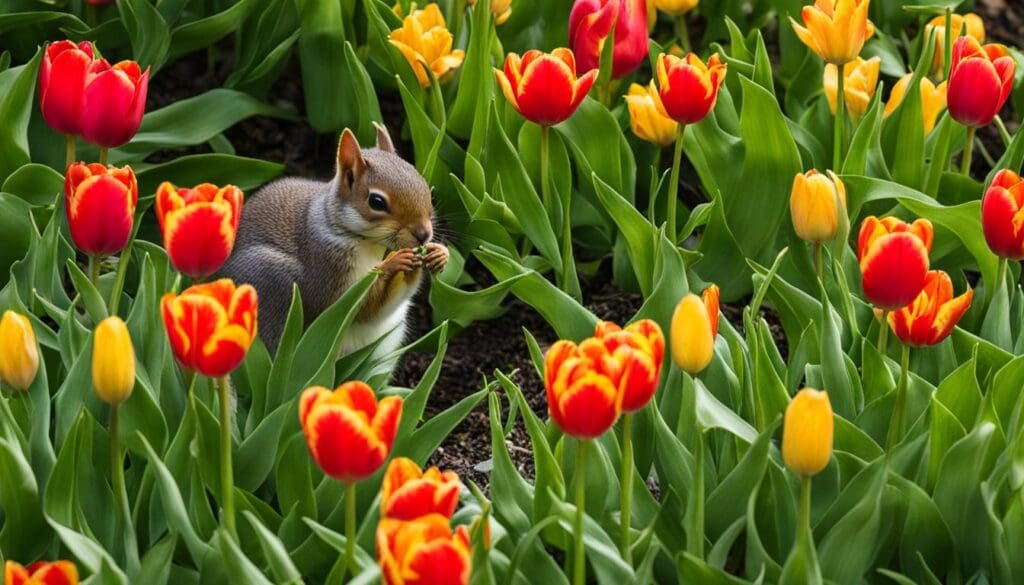
This strategy is not only effective but also maintains the ecology of your garden. The leaves decompose, enriching the soil and serving dual purposes of nutrition and protection.
Exploring Squirrel Repellents: Do They Work?
Squirrel repellents, from organic solutions to commercial products like squirrel repellent for tulip bulbs, are commonly used. However, their effectiveness can be mixed, and humane considerations must be considered. While you may be inclined to sprinkle various concoctions to protect your bulbs, choosing methods that do not harm wildlife is vital. Strong deterrents, such as hot pepper flakes, are ill-advised due to the potential of inflicting eye injuries on squirrels.
Instead, consider using squirrel-proof physical deterrents like chicken wire, cleverly positioned around your tulip bulbs. The following table outlines some inventive strategies for how to keep squirrels away from tulip bulbs:
| Deterrent Strategy | How It Works | Benefits | Drawbacks |
|---|---|---|---|
| Camouflaging with Leaves | Cover planting sites with shredded leaves to hide soil disturbances. | Environmentally friendly; nourishes the soil. | May need replenishing after weather events. |
| Chicken Wire Barrier | Place a layer over planted areas to physically block squirrels. | Effective barrier; can be removed when tulips sprout. | Requires installation and removal. |
| Commercial Repellents | Apply granules or sprays around the garden. | Convenient to use; may offer temporary protection. | Variable effectiveness; potential impact on other animals and environment. |
One of the keys to success is being persistent and creative in your approach to garden protection. By employing these innovative strategies, your tulip bulbs will likely avoid becoming a snack for the local squirrels. Keep your garden both visually pleasing and squirrel-resistant for a flourishing bloom season!
Ideal Plant Companions to Discourage Squirrel Interest
If unwelcome furry guests frequently visit your garden, it’s time to rethink your planting strategy. You can bolster your tulip bulb protection plan with elegance and efficiency by integrating certain plants that act as natural deterrents. This approach is a harmonious solution that does not involve harmful measures, ensuring that your garden remains a sanctuary for all its inhabitants.
Alluring Alternatives: Plants Squirrels Dislike
Squirrels are known for causing headaches among gardeners, especially in their notorious habit of digging up tulip bulbs. The trick here is to intersperse squirrel-repelling plants among your tulips, providing an invisible shield. Plants such as alliums are less than appealing to squirrels, with their potent aroma, and can effectively keep these critters at bay. In addition to alliums, consider integrating daffodils, hyacinths, and muscari into your garden. Their unpalatable taste for squirrels makes them excellent companions for safeguarding your tulips.
Leveraging Smells and Tastes to Your Advantage
In your ongoing campaign for squirrel-proofing tulip bulbs, utilizing the natural aversions of squirrels can significantly enhance your tulip’s chances. These crafty rodents are discouraged by certain smells and tastes, which you can use to your advantage by strategically selecting and placing plant companions. Low-growing groundcovers such as Vinca minor create a dense network of roots and stems, making the soil less accessible and significantly deterring squirrels from eating tulip bulbs.
| Plant Type | Scent/Taste Profile | Squirrel Repulsion Level | Companion Planting Benefits |
|---|---|---|---|
| Alliums | Onion-like | High | Adds height and visual interest; effectively repels squirrels |
| Daffodils | Bitter | High | Early spring blossoms; toxic to squirrels |
| Hyacinths | Mildly pungent | Moderate | Beautiful spring bloom; discourages squirrel digging |
| Muscari | Faintly musky | Moderate | Attractive groundcover; unpalatable to squirrels |
| Vinca minor | Neutral | Moderate | Dense growth habit; acts as a physical deterrent |
With these floral allies in your garden, you can comfortably anticipate the bloom of your tulips without fretting over their vulnerability to squirrels. Remember, the key to peaceful coexistence with wildlife does not necessarily require drastic measures but rather an understanding of nature’s balance and the thoughtful application of that knowledge.
Conclusion
As the spring planting season beckons, you may find yourself wrestling with the question, do squirrels eat tulip bulbs? The answer is nuanced, reflecting the sophisticated foraging habits of these agile creatures. The reality is that while squirrels may inadvertently gnaw on your bulbs, their digging is often driven by curiosity rather than appetite. This insight is the gardener’s first line of defense, pivotal for tulip bulb protection. By outwitting the natural tendencies of squirrels, you can minimize their interference in your garden.
Your toolkit for preventing squirrels from eating tulip bulbs is diverse, involving strategic steps like planting at the right time and depth, employing physical barriers, and sophisticated camouflaging techniques. Each garden presents unique challenges, so tailoring a combination of deterrents—like using chicken wire or planting bulbs that are distasteful to squirrels—can fortify your defenses. Bulb protection is an art that harmonizes with nature’s ecological dance, applying a mix of concealment, diversion, and deterrence strategies.
While protecting your tulips from squirrels is daunting, it isn’t insurmountable. Understand that a fail-safe solution might be elusive due to the determined nature of these sprightly rodents. Nonetheless, persistence and adaptation are your allies in safeguarding your blossoms. You are the steward of your garden’s vitality; guiding its success becomes a triumph against the odds. Embrace these measures, and you’ll be well on your way to a vibrant display of tulips, secure in the knowledge that you’ve given them the best chance to thrive.
FAQ
Do squirrels actually eat tulip bulbs, or do they cause other types of damage?
Squirrels are known for their frustrating tendency to dig up tulip bulbs, often taking a single bite before discarding them. This behavior is commonly observed among younger squirrels and appears more exploratory than dietary. While it might seem like squirrels are eating the bulbs, more often they are impulsively reacting to freshly tilled soil, mistaking it for a hiding place for nuts. Gardeners may witness the aftermath of squirrel curiosity through disturbed soil and bulbs left with characteristic bite marks.
Why are squirrels attracted to gardens with tulip bulbs?
A: Squirrels are naturally attracted to areas of disturbed soil as they often associate these spots with potential food sources like buried nuts. They investigate these areas, hoping to uncover a treasure trove of seeds or nuts. Unfortunately for gardeners, this leads to squirrels digging up and biting into tulip bulbs, especially if the planting site has been recently tilled or mulched, giving the impression of a hidden cache of goodies from a squirrel’s perspective.
What is the “bite-and-toss” phenomenon observed in squirrels?
The “bite-and-toss” phenomenon refers to the behaviour of squirrels biting into tulip bulbs and then discarding them rather than eating them as part of their diet. This behavior suggests that the squirrels are not necessarily interested in consuming the bulbs but are instead enticed by the act of foraging and the potential discovery of food. It is an instinctual, exploratory action that often damages the garden without any real benefit to the squirrel.
How can you tell if squirrels are the culprits behind damaged tulip bulbs?
You can evaluate the extent of the damage through specific signs that suggest squirrel activity. These include disturbed soil, bulbs that are dug up and have a single bite mark, or in some cases, the replacement of bulbs with other items like nuts. Recognizing these signs can help differentiate squirrel damage from other garden pests and guide you in adopting the appropriate protective measures.
When is the best time to plant tulip bulbs to avoid squirrel damage?
Planting tulip bulbs earlier in the fall can be advantageous. This timing allows the tulips to establish a stronger root system before the ground freezes, making the bulbs less detectable to squirrels. An established bulb is less likely to be sniffed out by these curious critters, reducing their chances of being dug up and bitten.
Does planting tulip bulbs at a deeper level deter squirrels from digging them up?
Planting tulip bulbs deeper—ideally 8 inches or more below the soil surface—can significantly reduce the likelihood of squirrels excavating and damaging them. The additional effort required to reach the buried bulbs acts as a deterrent, and the depth also helps mask the fresh scent of the tulip bulbs, which might attract squirrels.
What physical barriers can be used to protect tulip bulbs from squirrels?
One effective method is to use chicken wire or hardware cloth to create a physical barrier. You can lay chicken wire over the bed of bulbs or beneath the soil surface. This barrier prevents squirrels from reaching the bulbs, safeguarding your future blooms. It’s important to ensure that the edges of the wire are buried or secured so that squirrels can’t easily lift it and access the bulbs.
Are there creative ways to camouflage tulip bulb planting sites from squirrels?
Indeed, one creative camouflaging technique involves covering the planting area with shredded leaves or mulch to hide any signs of disturbance. This tricks the squirrels into thinking the area hasn’t been recently dug up, thus keeping them disinterested. Another method is to use chicken wire as a cover over the planted area, which can be removed when the plants begin to sprout in the spring. Effective camouflaging can significantly reduce the likelihood of squirrel interference.
Can repellents effectively prevent squirrels from eating tulip bulbs?
The effectiveness of repellents can vary. Some gardeners report success with scent-based repellents or commercial products like Critter Ridder, which combines pepper ingredients to discourage squirrels and other animals like skunks. However, using pepper or other harsh substances may harm the animals and is not recommended. It’s worth noting that while some repellents may offer short-term solutions, their efficacy isn’t guaranteed, and they need to be reapplied regularly.
What plants can be used to discourage squirrels from approaching tulip bulbs?
Planting particular companions around your tulips that are unattractive to squirrels can act as a natural deterrent. Alliums, for example, emit an onion-like scent that squirrels find off-putting. Similarly, daffodils, hyacinths, and Muscari are known for their smell or taste, that squirrels typically dislike. Integrating these plants into your garden can help protect your tulips by creating a barrier of unappealing scents and tastes for squirrels.
